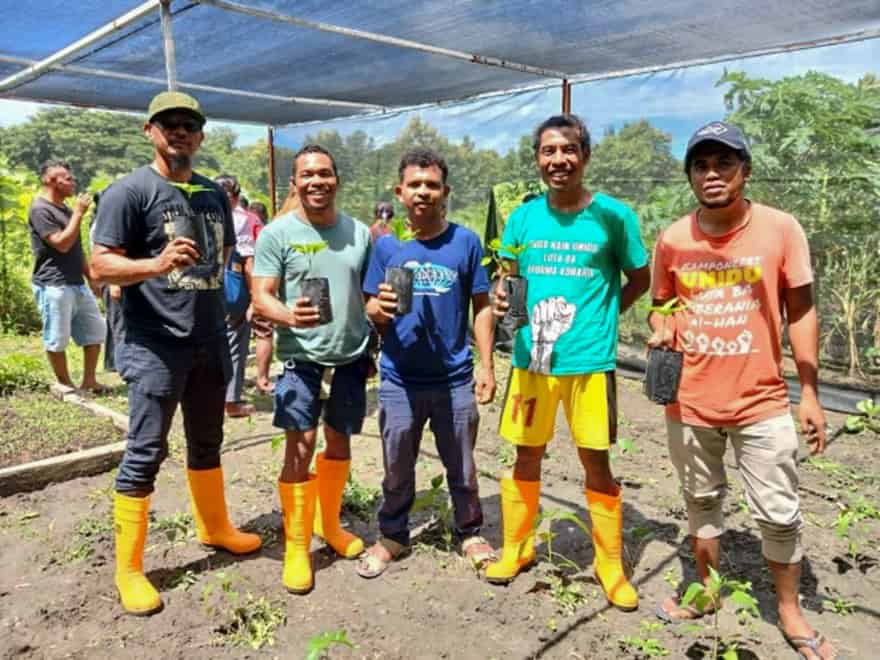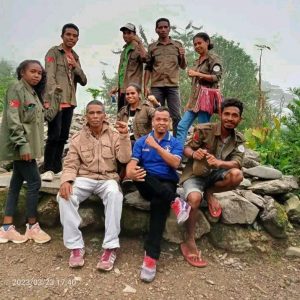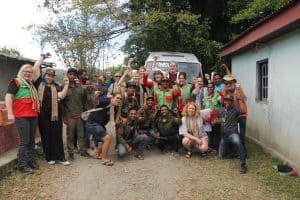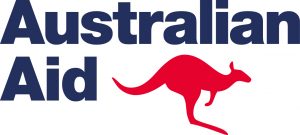
Farmers take part in agroecology and climate change adaption and mitigation training in Betano, Manufahi municipality. Source: KSI
Agricultural development and food security are ongoing challenges in Timor-Leste. Around 80% of the population are subsistence farmers, but production is not keeping pace with population growth.
Since 2016 APHEDA has worked with three local partner organisations – Instituto Edukasaun Popular (IEP), Kdadalak, Sulimutuk Institute (KSI) and Uniaun Agrikultor Ermera (UNAER)– to establish and strengthen farmers’ organisations across Timor-Leste to support rural communities to access land, learn sustainable farming practices and build collective power.
Our partner organisations have organised and supported thousands of farmers in 299+ cooperative ‘committee bases’ across nine of Timor-Leste’s thirteen municipalities. These groups have joined forces at the municipal level to form five farmers’ unions, with two more to be established by July 2025.
Mobilising rural communities across the country, they have identified common challenges and are taking action to overcome them collectively. The main challenges are:
- monocultural farming practices
- erratic weather exacerbated by climate change
- poor or damaged infrastructure
- unreliable electricity and water supplies
- land grabs (land deals that happen without the free, prior, and informed consent of communities)
Alongside the National Agrarian Reform Committee (KNRA) – an advocacy network they established to improve community access to land – farming communities are organising themselves to have a representative voice so they can influence agricultural policy at a local and national level.

Students and union leaders from the IEFS Peasant farming school in Ermera. Source: UNAER
Skilling-up the next generation of farmers
Following its independence, Timor-Leste has one of the youngest populations in the world. However, many young people have been lured away from their communities for work in the capital Dili or overseas, including as seasonal workers on Australian farms. Our partner organisations are set on reversing this trend.
Over the past 12 months, they provided agricultural resources, training and mentorship to around 4,700 farmers, including women, youth and people with disabilities in sustainable agricultural practices such as:
- agroecology and integrated farming
- producing organic fertilisers and pesticides
- establishing plant nurseries
- building terraces to prevent soil erosion
- wells digging to conserve water and combat salination
Supporting young people to improve their yields for much-needed incomes for their communities, they can prove that rural life can be prosperous, fulfilling and they can actively contribute to their country’s development. It also helps farmers understand and adapt to the impacts of climate change.
Together with teaching sustainable farming techniques, the project focuses on finding community-led solutions and movement building. Workshops in unionism, popular economy, leadership and social change help rural communities to collectively find answers to the challenges they face and advocate for their needs.
Some of this training is led by the Solidarity Economy Institute (IEFS), a popular education school run “by peasant farmers, for peasant farmers” in Ermera municipality. In 2023-24 the project trained 24 IEFS facilitators and supported 40 students through their Community Bachelor’s Degree program. These students also participated in an agroecology study tour to undertake practical learning demonstrations. These exchanges help inspire young people to stay in rural areas and help develop their communities and ensure that future farmer leaders are well-prepared and networked across the country.
Fair coffee: A cooperation between Australian and Timorese unionists

Australian unionists meet with UNAER and IEFS teachers during the 2023 APHEDA Study.
A key to the success of this project is its focus on forging strong and lasting people-to-people connections, not only in Timor-Leste but with like-minded activists and organisations across the world.
In August 2023, APHEDA hosted 12 Australian unionists on a study tour of Timor-Leste, where they visited several committee bases and met with farmers supported through this project. As well as meeting with the farmer’s unions in Manufahi and Ermera, the group visited families in the mountains who spoke about the many challenges they face growing Timor Leste’s most important crop, organically and sustainably grown coffee beans.
The coffee industry is dominated by for-profit monopoly supply chains, making it difficult for small producers to compete due to limited access to financial, social, and infrastructure capital. In response, the project has supported farmers in establishing the Solidarity Economy Federation (SEF) – a cooperative network of 14 committee bases representing 368 coffee-growing households. The SEF focuses on building and training cooperatives to ensure the quality processing of coffee for fair-trade export to Australia and Japan.
Creating links with Earthworker Cooperative in Victoria, their “Keep the Change” initiative is working to set up a progressive distribution network to sell the coffee to Australians for a just price and conditions of sale, giving Timorese coffee growers more effective and collective control over their incomes.
CoPower, a not-for-profit cooperative for Australia’s energy sector, has likewise backed the farmers. In 2023 CoPower members voted to provide a $10,000 grant from their democratic budget process. This generous contribution supported the establishment of committee bases and the farmers’ training, climate-change awareness and advocacy programs, helping to foster and grow this alternative solidarity economy model that benefits both people and the planet.
The ‘Supporting and strengthening rural farmers’ organisations in Timor-Leste’ project is supported by the Australian Government through the Australian NGO Cooperation Program (ANCP), IEU, UWU, CoPower and members of Union Aid Abroad–APHEDA.

